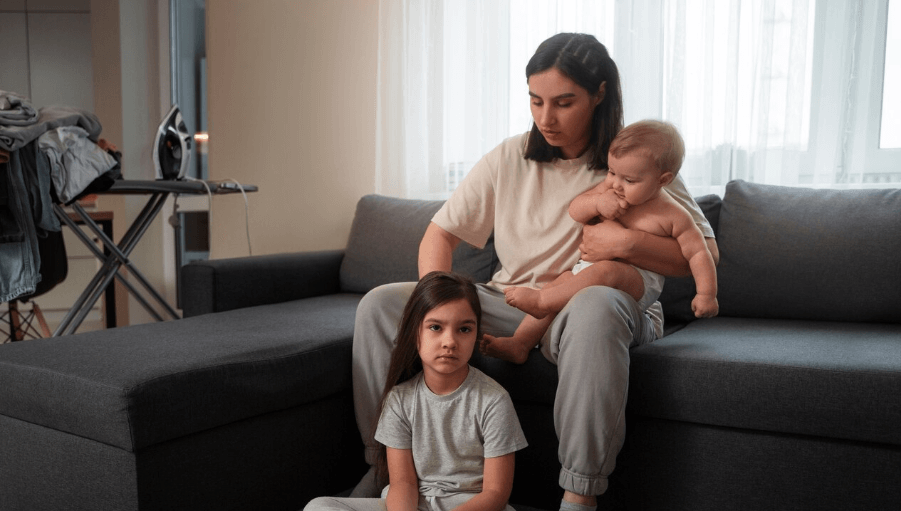Parenting cases or child-related family law proceedings are matters where people seek the help of the Court to resolve a dispute about their rights and obligations towards children.
If you are going through a divorce or ending a de facto relationship, you must prioritise any children involved.
If you want to make your divorce process easier, we can help!
Download our FREE All In One Divorce Checklist for a more detailed guide on the next steps.
The Impact on Children
At all stages during Family Court proceedings, you must remember the impact of divorce and separation’s impact when it involves children. Here are a few matters you should take into consideration:
Protect Against Domestic and Family Violence and Safeguard the Interests of Children
Emotional Stability and Support
Ensuring the child has a stable, loving environment is crucial. This involves providing consistent emotional support, understanding, and a sense of security. Both parents should strive to maintain a positive relationship with the child. This is regardless of their personal differences.
Protection from domestic and family violence
The child’s physical wellbeing and safety must be prioritised. This includes regular health check-ups, a safe living environment, and protection from any form of family violence or neglect. Parents should collaborate to ensure that these basic needs are always met. Protections against domestic violence should be in place. If you believe your children experienced domestic violence, contact the police immediately.
Maintaining Relationships
A child benefits from maintaining a healthy relationship with both parents. They should also have a relationship with other family members like grandparents and extended family. Ensuring the child has regular and meaningful contact with both parents, where safe and appropriate, is essential.

Avoid Forcing Children to Take Sides or Participate in Disputes Between the Parents
Maintain Open Communication
Keep lines of communication open with your children. Let them know that they can talk about their feelings without fear of judgment or repercussions. It’s important they understand that the separation is not their fault and that both parents love them unconditionally.
Avoid Negative Talk About the Other Parent
Refrain from speaking ill of the other parent in front of the children. Negative comments can create confusion and force children into feeling like they need to choose a side.
Present a United Front on Parenting
Despite the separation, it’s crucial to co-parent effectively. This means agreeing on parenting styles, rules, and decisions. Parents should present these consistently to the children.
Encourage Relationships with Both Parents
Facilitate and encourage the child’s relationship with the other parent. Make it clear that it’s okay and healthy for them to want to spend time with and love both parents.

Identify Issues Early and Explore Options for Settlement
Minimise Conflict and Stress
Early identification of potential issues allows for proactive management. This reduces the likelihood of conflicts escalating. This benefits both the parents and, crucially, the children, who are often the most affected by ongoing parental disputes.
Foster a Cooperative Environment
Addressing issues early can set a tone of cooperation and mutual respect. This environment is conducive to reaching amicable settlements. These are typically in the best interests of all parties involved, especially the children.
Seek Mediation
Consider family mediation services. Family dispute resolution practitioners can facilitate discussions. They can help parents find common ground and mutually agreeable solutions.
Use Collaborative Law Practices
Collaborative law involves both parties working with their lawyers and, sometimes, other family professionals. With this assistance, they can reach a settlement that best meets the needs of all parties.
Consider Counselling or Therapy
Sometimes, individual or joint counselling can help manage emotions and improve communication. This makes it easier to discuss and resolve issues.

The Principle of Proportionality and the Need to Control Costs
Choose the Right Legal Representation
If legal representation is necessary, choose a lawyer who is focused on resolving issues efficiently. Be clear about your budget and ask for an estimate of costs upfront.
Stay Informed and Organised
Be proactive in understanding the legal process and stay organised. Keeping good records and being prepared for meetings and hearings can reduce your lawyer’s time on your case.
Prioritise Issues
Focus on resolving the most important issues first. Avoid getting side-tracked by less significant matters. This can increase costs without adding value to the outcome.
Set a Budget
Establish a budget for legal expenses and communicate this with your lawyer. Regularly review legal bills to ensure they align with your expectations and budget.
Seek Out-of-Court Settlements
Whenever possible, aim for out-of-court settlements. Litigation is often the most expensive part of family law proceedings.
Explore options regarding financial support and resources
Approaching Service Australia, Australia’s child support agency can assist the primary child carer with parental responsibilities. Also, arranging a fair property settlement can help.

The Court’s primary concern when resolving or determining family disputes is to work out what is in the best interests of the child or children. This priority is not always as easy as it might sound. The Court takes a very cautious approach, especially when there are children. If there are any allegations of child abuse, they are taken seriously and investigated.
The children want to be loved and happy. You can go your separate ways and still achieve that with some consideration and thought.
Conclusion
Any intimate partner relationship that ends must consider the interests of any children of the relationship. Children need an emotionally stable environment, safety and healthy relationships with extended family.
Parents must maintain communication and be open to mediation and conflict resolution. Collaborative law approaches can also be useful to engage a range of professionals for the child’s benefit.
If you need help with family law matters, contact us for a free discovery call.

